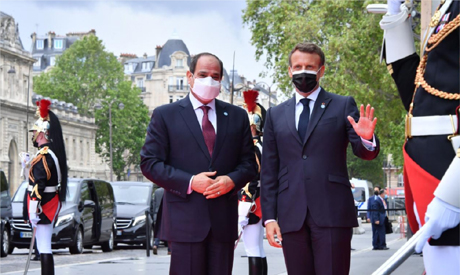
French President Emmanuel Macron (R) received Egyptian president Abdel-Fattah El-Sisi ahead of the lunch of Paris Conference on Monday, 17 May 2021, which aims to rally support for the Sudanese government in the transition followed the 2019 toppling of former president Omar al-Bashir. (Photo courtesy of the Egyptian presidency)
Egyptian President Abdel-Fattah El-Sisi has asserted Egypt's continued support to Sudan in order to achieve stability and development in the African nation, calling on all partners to back the Sudanese efforts.
Addressing the Paris Conference to support Sudan’s transition on Monday, El-Sisi announced Egypt’s contribution to the international initiative meant to settle Sudan’s debts through the utilisation of Egypt’s quota at the International Monetary Fund (IMF) for doubtful debts to be settled.
The Paris Conference, hosted by French President Emmanuel Macron and attended by world and African leaders, aims to rally support for the Sudanese government in the transition that followed the 2019 toppling of former president Omar Al-Bashir, who rule the country for three decades.
Egypt participation in the event, El-Sisi added, stems from a “deep” conviction that "the security and stability of Sudan is an integral part of Egypt's and the region's."
"It also mirrors Egypt's commitment and steadfast political will to spare no effort to support the sustainability of peace, development and stability in Sudan," he stressed.
El-Sisi praised the economic vision put forward by the interim government and its effort to benefit from the Egyptian experience in economic reform in order to achieve economic stability and clear its accumulated debts.
Sudan seeks assistance in paying off a $60 billion foreign debt bill to the International Monetary Fund (IMF). It is also attempting to secure investment in order to revive its economy weakened during Al-Bashir's era.
Speaking about how to support Sudan's transition, the Egyptian President called on Sudanese parties to lead efforts to bring peace and stability to their lands under a framework of comprehensive national consensus based on the national priorities of the Sudanese people.
He also praised the "tangible" achievements made by the transitional government, notably reaching a comprehensive peace agreement last October, which he said requires the international community's support for full implementation.
October's peace agreement between Sudan's transitional government and rebel groups was meant to put an end to decades-long regional conflicts that have left millions displaced and hundreds of thousands dead.
El-Sisi also urged support for the Sudanese efforts in the disarmament, demobilisation and reintegration programme aimed at ex-combatants.
"The challenges that have been faced by many countries in our region have proven that building the fundamentals of the state and its various institutions on staunch and sound foundations, especially the unified national army, is the main pillar to ensure peace and stability in it," he assured.
He called for upholding the principle of citizenship based on national consensus to confront attempts at division.
Peace, stability, and the Nile
El-Sisi also said that maintaining peace and stability in Khartoum requires the provision of a "favourable" political and security environment at the regional level, based on the rules of international law and relevant international agreements, including the 1902 Agreement.
"I stress, in this regard, the importance of supporting Sudan's right to spread its sovereignty over all of its lands," he said.
He emphasised that if the political will is available, the Nile River can be used to help foster comprehensive cooperation between the countries of the Nile Basin in a way that enhances stability in the region without harming any party.
Border tensions remain high between Sudan and Ethiopia over the Al-Fashaqa region, where Ethiopian farmers have long cultivated fertile land claimed by Sudan.
Also, the Grand Ethiopian Renaissance Dam being built by Addis Ababa on the Blue Nile, a tributary of the Nile, has been a source of contention between Ethiopia one side, and Sudan and Egypt on the other.
Negotiations between the three countries have been on hold due to Addis Ababa’s refusal to sign a legally binding deal on the rules for filling and operating the controversial dam to ensure the downstream countries’ water rights.
Short link: